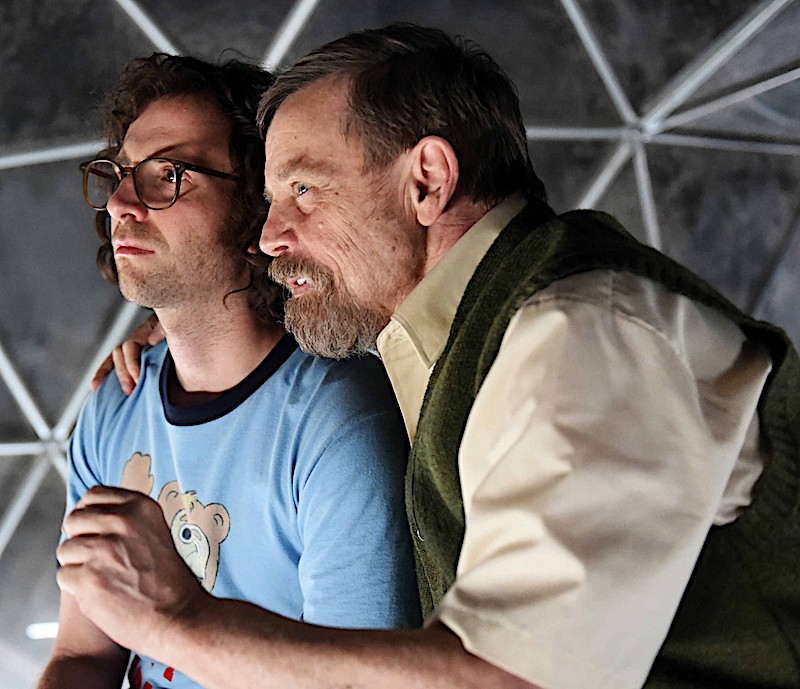LFF 2017: Journey's End review - classic play becomes cracking film | reviews, news & interviews
LFF 2017: Journey's End review - classic play becomes cracking film
LFF 2017: Journey's End review - classic play becomes cracking film
Saul Dibb and a terrific cast bring RC Sherriff's play to the big screen

There have been several film and TV versions of RC Sherriff’s World War One play since it debuted on the London stage in 1928, but Saul Dibb’s new incarnation, shown at London Film Festival, is testament to the lingering potency of the piece.
Front and centre is Sam Claflin as Captain Stanhope, the much-admired commanding officer of an infantry company waiting nervously for an expected German onslaught. They know they’re a sacrificial gesture, under-manned and under-equipped but ordered to “hold them up as long as you can”. Stanhope is on the brink of mental collapse, holding himself together with whisky but sticking it out because “it’s the only thing a decent man can do”.
Claflin’s staring-eyed desperation is agonising to behold (there’s a dream sequence where he gazes, mesmerised, into a searing orange inferno). In contrast there’s Paul Bettany’s Osborne (or “Uncle”), a schoolteacher and family man who’s found a kind of Zen resignation. His benign concern for his men, including the impossibly green newcomer Lieutenant Raleigh (a baby-faced Asa Butterfield), is touching but futile. Toby Jones brings wry relief as Mason the company cook, fighting a losing battle against the uneatable, while Stephen Graham finds comradely warmth amid the gloom.
The rotting trenches and aura of apocalyptic breakdown rapidly vaporise Raleigh’s hero-worship of Stanhope (who’s engaged to his sister), and his first taste of action shatters his public-schoolboy illusions. Dibb has added just enough filmic scope to fill out the play’s contours without compromising the tightly-knit dramatic engine at its core. Excellent.
 A Fantastic Woman
A Fantastic Woman
If you live in a politically-correct bubble, you might persuade yourself that prejudice against gay or transgender people is unthinkable. Dream on. Sebastian Lelio’s story of a Spanish trans woman running a gauntlet of hostility and abuse from her dead lover’s family cuts to the core of our expectations about equality or mere civilised behaviour (its Spanish title is Una Mujer Fantastica). Marina (Daniela Vega, pictured above), a waitress and singer, is in the midst of an evidently loving and fulfilling affair with Orlando (Francisco Reyes), a 50-something businessman. His sudden death blows her life inside out, and outside his comforting embrace she’s painfully reminded that it’s a thin line between society and the jungle. Orlando’s ex-wife forbids her to attend his funeral (“this is perversion,” she sneers), and his son throws her out of his father’s flat before having her abducted and abused by this thuggish friends. The cops assume she’s a prostitute, and force her to undergo humiliating physical examinations. Battered but not quite bowed, Marina manages to cling to her dignity and her sense of identity, not least thanks to a bit of philosophical guidance from her singing teacher. On a path littered with painful blows and booby traps, she finds a calm place in Handel’s Ombra mai fu. ★★★★
 Brigsby Bear
Brigsby Bear
Dave McCary’s bizarre but endearing indy feature takes a potentially hideous tale of abduction and control and transforms it using the amazing healing powers of fantasy and creativity. James, a fully-fledged bespectacled geek, has been confined to a desert bunker in the midst – or so he’s been led to believe – of a wilderness in which the air is too toxic to breathe. His sole entertainment is a crude TV animation series about the intergalactic hero, Brigsby Bear. Imagine his surprise when he’s rescued from his abductor-“parents”, Ted and April, by police, and is returned to a society teeming with stuff he’s never seen – cable TV, smartphones, recreational drugs, Macbooks, young people, sex etc. Desocialised James (Kyle Mooney) is gradually thawed out by interaction with his sister Aubrey (Ryan Simpkins) and her pretty cool friends, and when he grasps that he can recreate a new improved Brigsby using state-of-the art gadgetry, he’s on the way to becoming an internet sensation. It’s nuts but it works, not least thanks to nifty contributions from Claire Danes as James’s therapist and Greg Kinnear as the local police chief who yearns to be Obi-Wan Kenobi. The hommages don’t end there – there’s even a role for Mark Hamill as Ted the abductor (Hamill and Mooney pictured above). ★★★
1%
Crude, violent and generally unpleasant tale about duelling biker gangs in Australia. With the intimidating Knuck (Matt Nable) in jail, where he succumbs to the joys of sadistic buggery, Paddo (Ryan Corr) has been running his Hell’s Angels-style crew, The Copperheads. Knuck is about to be released, but trouble brews when Paddo is forced to make a deal with a rival gang, thanks to the antics of his dim-witted brother. Things go very bad indeed when Paddo’s girlfriend Trina (Abbey Lee) starts giving it the full Lady Macbeth and goads him towards a murderous takeover of the Copperheads. Not long on plausibility – this is a world where nobody bothers to call the police even when there’s a full-scale gun battle in a pleasant residential suburb. ★★
rating
Explore topics
Share this article
The future of Arts Journalism
You can stop theartsdesk.com closing!
We urgently need financing to survive. Our fundraising drive has thus far raised £33,000 but we need to reach £100,000 or we will be forced to close. Please contribute here: https://gofund.me/c3f6033d
And if you can forward this information to anyone who might assist, we’d be grateful.

Subscribe to theartsdesk.com
Thank you for continuing to read our work on theartsdesk.com. For unlimited access to every article in its entirety, including our archive of more than 15,000 pieces, we're asking for £5 per month or £40 per year. We feel it's a very good deal, and hope you do too.
To take a subscription now simply click here.
And if you're looking for that extra gift for a friend or family member, why not treat them to a theartsdesk.com gift subscription?
more Film
 Maria review - Pablo Larraín's haunting portrait of an opera legend
Angelina Jolie puts body and soul into her portrayal of Maria Callas
Maria review - Pablo Larraín's haunting portrait of an opera legend
Angelina Jolie puts body and soul into her portrayal of Maria Callas
 Babygirl review - would-be steamy drama that only flirts with transgression
Nicole Kidman gets hot and bothered about a sexy intern’s power plays
Babygirl review - would-be steamy drama that only flirts with transgression
Nicole Kidman gets hot and bothered about a sexy intern’s power plays
 It's Raining Men review - frothy French comedy avoids dating-app reality
Laure Calamy shines as a dentist whose marriage is in trouble
It's Raining Men review - frothy French comedy avoids dating-app reality
Laure Calamy shines as a dentist whose marriage is in trouble
 A Real Pain review - Jesse Eisenberg and Kieran Culkin take a Holocaust tour of Poland
It's part comedy, part road movie and part psychotherapy session
A Real Pain review - Jesse Eisenberg and Kieran Culkin take a Holocaust tour of Poland
It's part comedy, part road movie and part psychotherapy session
 Blu-ray: The Hop-Pickers
Ground-breaking and colourful Czech musical
Blu-ray: The Hop-Pickers
Ground-breaking and colourful Czech musical
 Nickel Boys review - a soulful experiment
Pulitzer-winner becomes an immersive elegy to black teenage crime and punishment
Nickel Boys review - a soulful experiment
Pulitzer-winner becomes an immersive elegy to black teenage crime and punishment
 Best of 2024: Film
theartsdesk's movie critics pick their favourites from the last 12 months
Best of 2024: Film
theartsdesk's movie critics pick their favourites from the last 12 months
 Best of 2024: Blu-ray
The pick of the year's releases: films spanning decades, continents and genres
Best of 2024: Blu-ray
The pick of the year's releases: films spanning decades, continents and genres
 Nosferatu review - Lily-Rose Depp stands out in uneven horror remake
Robert Eggers leaves his mark on adaptation of classic, but it’s not always for the best
Nosferatu review - Lily-Rose Depp stands out in uneven horror remake
Robert Eggers leaves his mark on adaptation of classic, but it’s not always for the best
 Blu-ray: Hitchcock - The Beginning
A box set shows how Alfred Hitchcock embraced the sound revolution – pathologies intact
Blu-ray: Hitchcock - The Beginning
A box set shows how Alfred Hitchcock embraced the sound revolution – pathologies intact
 Wallace & Gromit: Vengeance Most Fowl review - an old foe returns
Stop-motion animation on an epic scale
Wallace & Gromit: Vengeance Most Fowl review - an old foe returns
Stop-motion animation on an epic scale
 Blu-ray: Three Wishes for Cinderella
Witty, engaging Czech fairy tale with an appealingly feisty heroine
Blu-ray: Three Wishes for Cinderella
Witty, engaging Czech fairy tale with an appealingly feisty heroine

Add comment